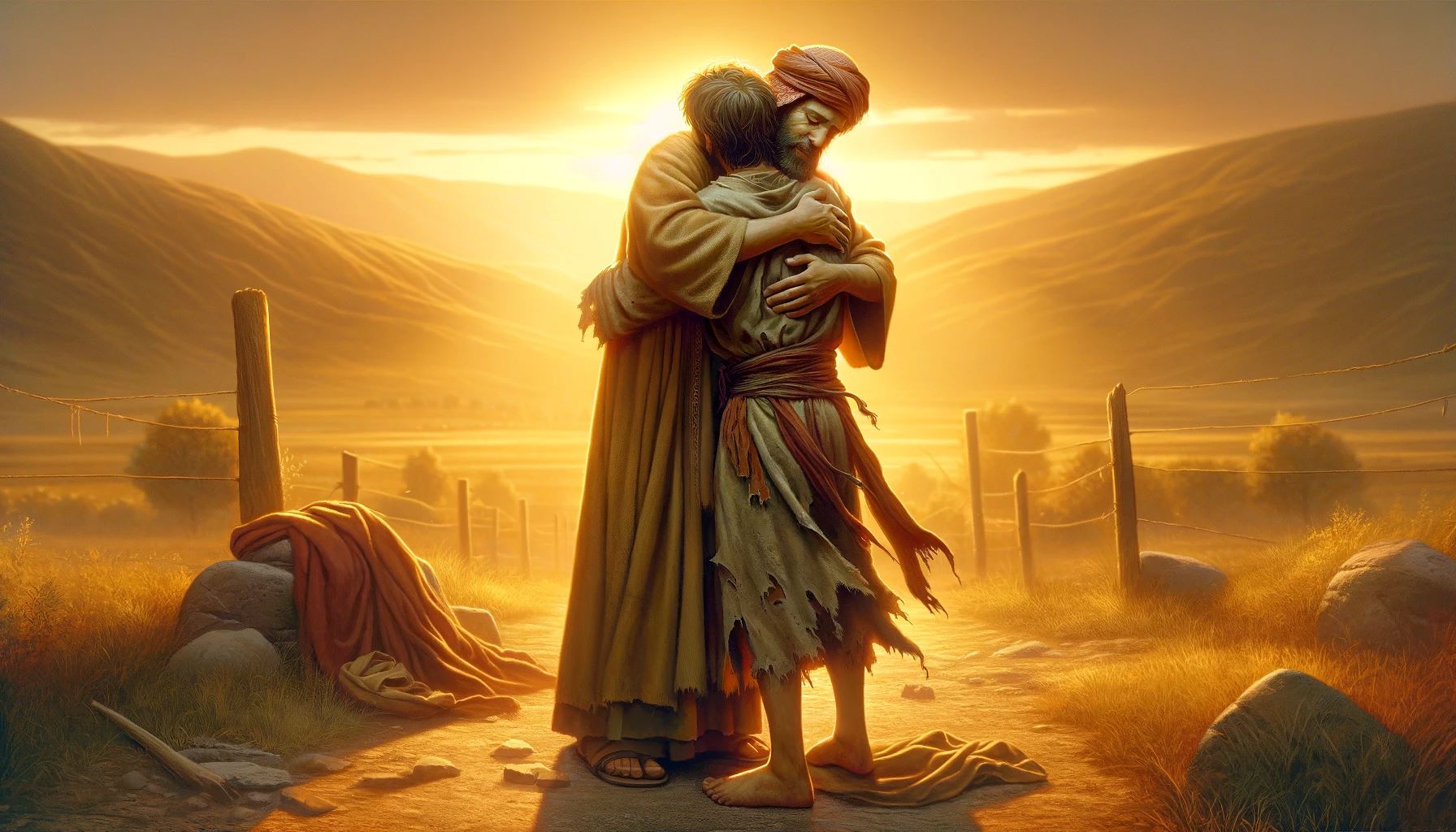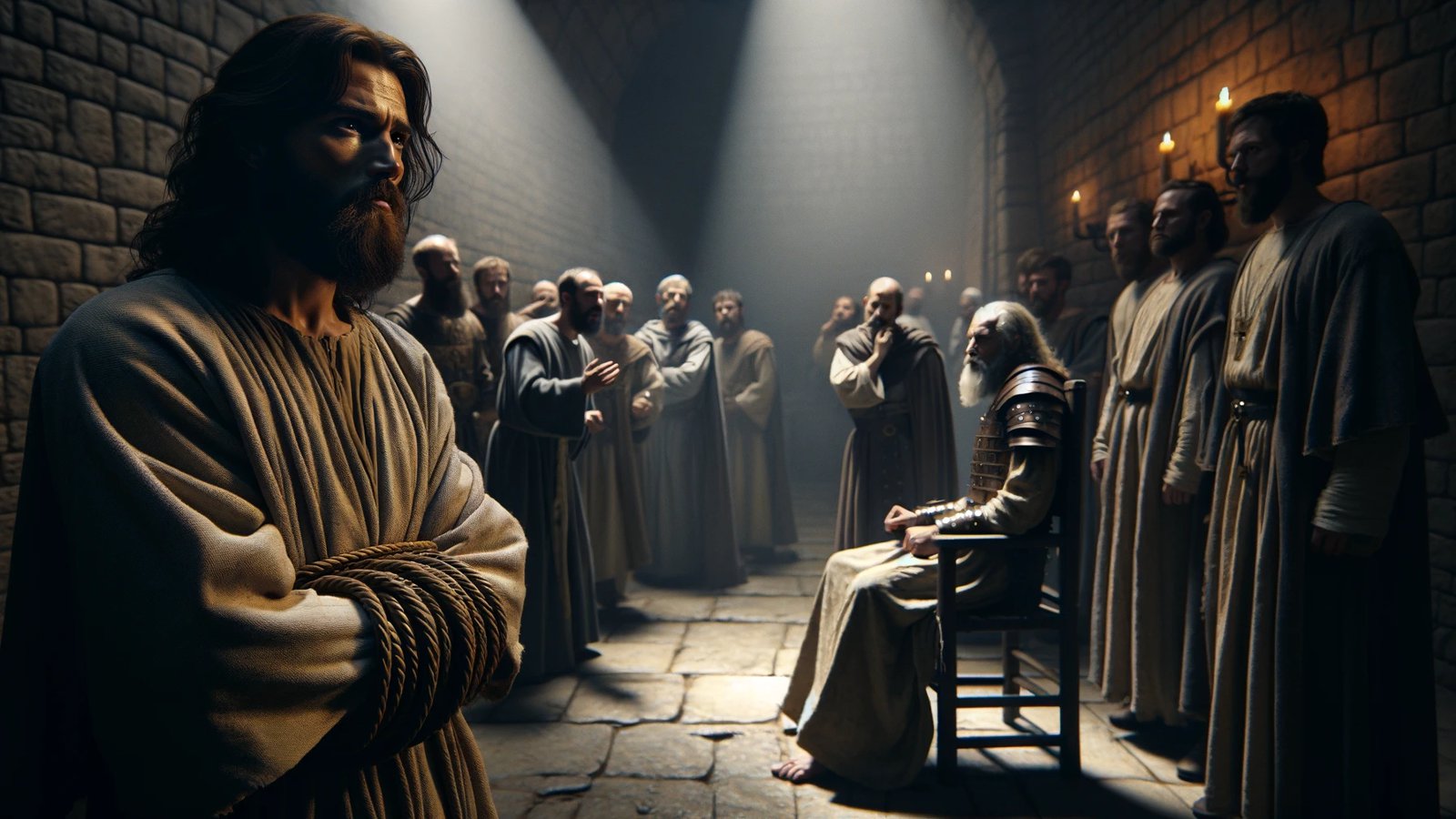Home>Theology and Spirituality>What Does The Bible Say About John The Baptist


Theology and Spirituality
What Does The Bible Say About John The Baptist
Published: February 20, 2024
Ericka Andersen, an editor at Christian.net, expertly merges digital strategy with content creation, focusing on faith and societal issues. Her communication skills enhance the platform's engaging narratives, fostering meaningful dialogue on belief's impact on society.
Discover what the Bible teaches about John the Baptist and his significance in theology and spirituality. Explore the profound insights and lessons from his life and ministry.
(Many of the links in this article redirect to a specific reviewed product. Your purchase of these products through affiliate links helps to generate commission for Christian.net, at no extra cost. Learn more)
Table of Contents
Introduction
John the Baptist is a prominent figure in the New Testament, known for his pivotal role in preparing the way for the ministry of Jesus Christ. His life and teachings are deeply rooted in the rich tapestry of biblical history, and his influence continues to resonate through the ages. As we delve into the profound significance of John the Baptist, we gain valuable insights into his birth, ministry, and enduring legacy.
The biblical account of John the Baptist provides a compelling narrative that transcends time and cultural boundaries. His story unfolds in the context of ancient Judea, a region characterized by religious fervor and societal upheaval. Against this backdrop, John emerges as a compelling and enigmatic figure, driven by a profound sense of purpose and divine calling.
The life of John the Baptist is intricately intertwined with the fulfillment of Old Testament prophecies, particularly those foretelling the coming of a herald who would prepare the way for the Messiah. This prophetic anticipation infuses John's story with a sense of cosmic significance, underscoring his role as a pivotal figure in the unfolding drama of redemption.
As we embark on a journey through the life and ministry of John the Baptist, we are invited to explore the profound spiritual truths encapsulated in his message and mission. His unwavering commitment to proclaiming repentance and preparing the hearts of the people for the imminent arrival of the Messiah serves as a timeless testament to the power of divine calling and the transformative impact of genuine faith.
In the subsequent sections, we will delve into the intricacies of John the Baptist's birth, his radical ministry and message, his profound relationship with Jesus, the challenges he faced, and the enduring legacy he left behind. Through this exploration, we will gain a deeper understanding of the profound spiritual and theological significance of John the Baptist's life and teachings, and the enduring impact he has had on the Christian faith.
Read more: What Does Jesus Say About John The Baptist
John the Baptist's Birth and Early Life
John the Baptist's birth and early life are shrouded in divine providence and prophetic fulfillment. According to the Gospel of Luke, John's miraculous conception was foretold by an angel to his father, the priest Zechariah, while he was serving in the temple. This divine announcement, met with initial disbelief by Zechariah, resulted in his temporary loss of speech until the day of John's birth.
The name "John," meaning "God is gracious," was bestowed upon him by divine decree, signifying the extraordinary nature of his calling and mission. John's birth heralded a season of great rejoicing, as his arrival marked the fulfillment of ancient prophecies and the dawning of a new era in redemptive history.
John's upbringing in the wilderness of Judea, marked by a life of asceticism and spiritual devotion, set the stage for his future ministry. His attire of camel's hair and diet of locusts and wild honey reflected his separation from the trappings of worldly comfort and his singular focus on the divine mandate entrusted to him.
As John matured, he grew in wisdom and stature, and the hand of the Lord was undeniably upon him. His formative years in the wilderness instilled in him a deep reverence for God and a fervent passion for righteousness. This foundational period of preparation equipped John with the spiritual fortitude and unwavering commitment essential for the weighty task that lay ahead.
The convergence of John's extraordinary birth, his upbringing in the wilderness, and the divine anointing upon his life collectively underscored the profound significance of his role as the forerunner of the Messiah. His birth and early years serve as a testament to the intricate interplay of divine sovereignty and human agency, culminating in the emergence of a prophetic voice that would resound throughout the corridors of history.
In the annals of biblical history, John the Baptist's birth and early life stand as a testament to the enduring faithfulness of God in orchestrating the fulfillment of His redemptive purposes. The remarkable circumstances surrounding John's conception and upbringing foreshadowed the extraordinary nature of his ministry and the indelible impact he would have on the course of salvation history.
John's Ministry and Message
John the Baptist's ministry and message were characterized by uncompromising conviction, fervent proclamation, and a resolute call to repentance. As the prophesied forerunner of the Messiah, John embarked on a radical mission to prepare the hearts of the people for the imminent arrival of Jesus Christ. His ministry unfolded against the backdrop of the Judean wilderness, where he fearlessly proclaimed a message of repentance and heralded the arrival of the long-awaited Messiah.
Central to John's ministry was the call to repentance, encapsulated in his proclamation, "Repent, for the kingdom of heaven is at hand" (Matthew 3:2). This clarion call reverberated throughout the region, compelling individuals to turn from their sinful ways and embrace a renewed commitment to righteousness. John's impassioned plea for repentance served as a catalyst for spiritual awakening, stirring the hearts of the people and igniting a fervent desire for reconciliation with God.
In addition to his call to repentance, John administered the symbolic rite of baptism as a tangible expression of spiritual purification and readiness for the Messiah's arrival. The act of baptism symbolized the washing away of sins and the emergence of a transformed life dedicated to God's purposes. Through this profound ritual, John facilitated a tangible and transformative experience for those who sought spiritual renewal, paving the way for a deeper encounter with the redemptive work of the Messiah.
John's ministry also attracted widespread attention and drew multitudes from various walks of life, including tax collectors, soldiers, and religious leaders. His bold and uncompromising message resonated with the masses, transcending social barriers and stirring the collective conscience of the people. The impact of John's ministry was further amplified by his unwavering commitment to truth and righteousness, which served as a beacon of hope in a society fraught with moral ambiguity and spiritual apathy.
As the precursor to Jesus Christ, John's ministry and message laid the groundwork for the transformative work that would unfold through the ministry of the Messiah. His unwavering dedication to proclaiming repentance and preparing the hearts of the people exemplified the timeless principles of divine calling, spiritual renewal, and the profound impact of authentic faith. Through his radical ministry and unyielding message, John the Baptist emerged as a herald of hope, heralding the dawn of a new era in redemptive history and paving the way for the transformative power of the gospel.
John's Relationship with Jesus
John the Baptist's relationship with Jesus is a profound and pivotal aspect of his life and ministry. As the forerunner of the Messiah, John's connection with Jesus transcends mere historical significance, embodying a divine orchestration of purpose and destiny. Their relationship unfolds against the backdrop of divine providence and the fulfillment of ancient prophecies, underscoring the profound spiritual bond that united these two extraordinary figures.
The Gospel accounts vividly depict the momentous encounter between John and Jesus at the Jordan River, where John was baptizing multitudes as a symbol of repentance and spiritual renewal. In a remarkable display of divine revelation, John recognized Jesus as the long-awaited Messiah, declaring, "Behold, the Lamb of God, who takes away the sin of the world!" (John 1:29). This pivotal proclamation not only affirmed Jesus' redemptive role but also solidified the spiritual connection between John and the one whom he had been appointed to herald.
The relationship between John and Jesus transcended mere acquaintance, embodying a profound spiritual kinship rooted in their shared mission and divine calling. John's unwavering commitment to preparing the way for Jesus and his profound acknowledgment of Jesus' divine identity underscored the depth of their relationship. Furthermore, Jesus Himself testified to the unparalleled significance of John's role, affirming, "Among those born of women there has arisen no one greater than John the Baptist" (Matthew 11:11).
As Jesus' ministry gained momentum, John's own influence waned, culminating in his imprisonment and eventual martyrdom. Despite the challenges and uncertainties he faced, John remained resolute in his conviction regarding Jesus' identity and redemptive mission. Even from the confines of his prison cell, John sent his disciples to inquire of Jesus, seeking affirmation of his faith in the midst of adversity. Jesus' response not only reassured John but also affirmed the enduring bond between them, as he declared, "Blessed is the one who is not offended by me" (Matthew 11:6).
The relationship between John the Baptist and Jesus stands as a testament to the intricate interplay of divine purpose and human agency, weaving a narrative of profound spiritual significance and enduring legacy. Their connection transcends the boundaries of time and space, encapsulating the timeless truth of divine ordination and the transformative power of unwavering faith. In the annals of biblical history, the relationship between John and Jesus serves as a poignant reminder of the profound impact of spiritual kinship and the enduring legacy of those who wholeheartedly embrace their divine calling.
John's Imprisonment and Death
John the Baptist's unwavering commitment to truth and righteousness led to his eventual imprisonment and tragic death. His fearless denunciation of King Herod's unlawful marriage to Herodias, the wife of his brother Philip, incurred the wrath of the ruling authorities. Despite the perilous circumstances, John remained steadfast in his adherence to moral integrity and unyielding dedication to God's divine principles.
Imprisoned in the fortress of Machaerus, John faced the harsh reality of confinement and isolation. The confines of his cell bore witness to the profound sacrifice he endured for the sake of upholding righteousness and speaking truth to power. Amidst the darkness of captivity, John's unwavering faith and resolute spirit remained unshaken, serving as a beacon of hope in the face of adversity.
The circumstances surrounding John's imprisonment underscore the inherent risks associated with unwavering commitment to divine truth and moral rectitude. His steadfast refusal to compromise his principles, even in the face of imminent danger, exemplified the profound depth of his faith and the enduring legacy of his uncompromising witness.
Tragically, John's imprisonment culminated in his unjust execution at the behest of Herodias' daughter, who requested his head on a platter during a banquet. The gruesome act of beheading marked the tragic end of John's earthly life, a poignant testament to the profound cost of unwavering fidelity to divine truth in the midst of a morally compromised world.
The martyrdom of John the Baptist stands as a sobering reminder of the inherent challenges and sacrifices entailed in bearing witness to unwavering faith and moral conviction. His unjust death serves as a poignant symbol of the enduring struggle between the forces of righteousness and the pervasive influence of moral compromise.
In the annals of biblical history, John's imprisonment and martyrdom serve as a testament to the enduring legacy of those who courageously uphold divine truth, even in the face of formidable opposition. His unwavering commitment to righteousness and unyielding faith in the midst of adversity continue to inspire generations, underscoring the timeless significance of his enduring witness.
Read more: What Does The Bible Say About Catholicism
John's Legacy and Impact
John the Baptist's legacy and impact reverberate through the annals of biblical history, leaving an indelible imprint on the fabric of Christian faith and spirituality. His profound influence transcends the confines of time and space, embodying the enduring legacy of unwavering faith, prophetic calling, and uncompromising commitment to divine truth.
The enduring impact of John the Baptist is intricately woven into the tapestry of redemptive history, serving as a poignant reminder of the transformative power of authentic faith and unwavering dedication to God's divine purposes. His radical ministry and unwavering proclamation of repentance continue to resonate as timeless principles that transcend cultural and temporal boundaries, inspiring countless individuals to embrace a renewed commitment to righteousness and spiritual renewal.
John's legacy is further underscored by his pivotal role as the forerunner of Jesus Christ, the long-awaited Messiah. His unwavering dedication to preparing the hearts of the people for the imminent arrival of the Messiah exemplifies the profound significance of his divine calling and the enduring impact of his prophetic mission. The profound spiritual kinship between John and Jesus serves as a testament to the transformative power of unwavering faith and the enduring legacy of those who wholeheartedly embrace their divine calling.
Furthermore, John's uncompromising witness and steadfast commitment to divine truth, even in the face of persecution and martyrdom, stand as a timeless testament to the enduring legacy of those who courageously uphold righteousness in the midst of moral compromise. His martyrdom serves as a poignant symbol of the enduring struggle between the forces of righteousness and the pervasive influence of moral compromise, inspiring generations to stand firm in their faith and unwavering commitment to truth.
In essence, John the Baptist's enduring legacy and impact serve as a timeless testament to the transformative power of unwavering faith, prophetic calling, and uncompromising commitment to divine truth. His life and ministry continue to inspire and challenge individuals to embrace a renewed commitment to righteousness, heralding the dawn of a new era in redemptive history and paving the way for the transformative power of the gospel.
Conclusion
In conclusion, the profound significance of John the Baptist's life and ministry transcends the confines of historical narrative, embodying a timeless testament to the transformative power of unwavering faith, prophetic calling, and uncompromising commitment to divine truth. His extraordinary birth, marked by divine providence and prophetic fulfillment, heralded the dawning of a new era in redemptive history, setting the stage for his radical ministry and enduring legacy.
John's unwavering commitment to proclaiming repentance and preparing the hearts of the people for the imminent arrival of the Messiah serves as a timeless testament to the power of divine calling and the transformative impact of genuine faith. His resolute call to repentance, coupled with the symbolic rite of baptism, ignited a fervent desire for spiritual renewal and reconciliation with God, paving the way for the transformative work of the Messiah.
Furthermore, John's profound relationship with Jesus exemplifies the divine orchestration of purpose and destiny, underscoring the enduring bond between these two extraordinary figures. His unwavering dedication to preparing the way for Jesus and his steadfast acknowledgment of Jesus' divine identity serve as a poignant reminder of the transformative power of unwavering faith and the enduring legacy of those who wholeheartedly embrace their divine calling.
The martyrdom of John the Baptist stands as a sobering reminder of the inherent challenges and sacrifices entailed in bearing witness to unwavering faith and moral conviction. His unjust death serves as a poignant symbol of the enduring struggle between the forces of righteousness and the pervasive influence of moral compromise, inspiring generations to stand firm in their faith and unwavering commitment to truth.
In essence, John the Baptist's enduring legacy and impact serve as a timeless testament to the transformative power of unwavering faith, prophetic calling, and uncompromising commitment to divine truth. His life and ministry continue to inspire and challenge individuals to embrace a renewed commitment to righteousness, heralding the dawn of a new era in redemptive history and paving the way for the transformative power of the gospel.














